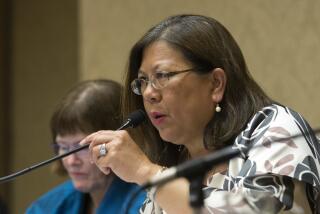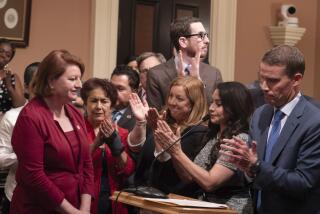Editorial: California may be liberal, but it’s still a degrading boys’ club
The sexual harassment and intimidation allegations against Harvey Weinstein are loathsome, but at least some good has emerged from his downfall. Women are coming forward in large and, frankly, humbling numbers to say, “Yeah, it happened to me too.”
Among those who added their voices and stories are more than 140 female legislators, lobbyists and political staffers in Sacramento who signed a letter this week saying that sexual harassment is pervasive in the state capital. “Each of us has endured, or witnessed or worked with women who have experienced some form of dehumanizing behavior by men with power in our workplaces,” the letter reads. “Men have groped and touched us without our consent, made inappropriate comments about our bodies and our abilities. Insults and sexual innuendo, frequently disguised as jokes, have undermined our professional positions and capabilities. Men have made promises, or threats, about our jobs in exchange for our compliance, or our silence. They have leveraged their power and positions to treat us however they would like.”
The letter’s signatories included Christine Pelosi, chair of the Women’s Caucus of the California Democratic Party and daughter of House Minority Leader Nancy Pelosi (D-San Francisco); Fiona Ma, a member of the state Board of Equalization; and six of the 26 female state legislators. One of them, Assemblywoman Cristina Garcia (D-Bell Gardens), chair of the Legislative Women’s Caucus, says that even being elected doesn’t make a woman safe from harassment, as she learned shortly after being sworn into office in 2012.
This may be dismaying, but it shouldn’t be much of a surprise to hear stories of sexual harassment in the halls of power. Any industry, profession or company where there is an imbalance of power between men and women is ripe for abuse. That’s bad enough in academia or Silicon Valley, but it’s an extra problem when women are underrepresented among those who set policy and make laws that affect the lives and livelihoods of all Californians.
Even in liberal California, political power is disproportionately wielded by men.
It’s troubling, too, that we’ve accepted this imbalance and everything that it entails for so long. But then, we live in a country that just handed the White House to a former reality TV star who boasted about groping women, instead of a woman with decades of experience in government. So that sort of behavior by men is not just condoned by the body politic, it may even be seen as a plus.
The leaders of both houses of the California Legislature — both men — said the right words in response to the revelations of the letters. That’s good. To change behavior, the first step is admitting there’s a problem. But as recovering addicts can attest, actually ending deeply ingrained bad habits is considerably more difficult. The proof of the leaders’ commitment will be the measures they take to empower their female colleagues in the Legislature, such as ensuring that women have equal opportunities to chair committees and calling out and penalizing harassment when it occurs.
What would also help is increasing the ranks of women in elective office. Yes, women have made many gains since they were granted the right to vote 97 years ago. In fact it’s likely that the women in Sacramento who signed this letter — and the ones who subsequently spoke out about their own stories — did so precisely because they hold enough collective power not to worry about their statements coming back to haunt them. But we’re not even close to parity.
Even in liberal California, political power is disproportionately wielded by men, starting at the top (a woman has never served as governor of California) and continuing down to local government. There is only one woman in state government who holds a statewide elective position: Controller Betty Yee. And less than a quarter of the 120 members of the Legislature are women, which is par for the paltry course in state legislatures across the country. The Los Angeles City Council, meanwhile, has but two women among its 15 members.
It’s not clear why the Weinstein story has become such a watershed moment for sexual harassment, as opposed to just another momentary scandal about a powerful man accused of inappropriate behavior toward women. But women should keep sharing their stories and empowering others to do so as well.
Sexual harassment and intimidation in the workplace isn’t just a Hollywood problem or a Sacramento problem. It’s a human problem. And the more that women feel safe speaking up when they see or experience inappropriate behavior in the statehouse, the courtroom, the classroom or the boardroom, the more likely it will be that such experiences become an aberration instead of an occupational hazard.
Follow the Opinion section on Twitter @latimesopinion and Facebook
More to Read
A cure for the common opinion
Get thought-provoking perspectives with our weekly newsletter.
You may occasionally receive promotional content from the Los Angeles Times.






